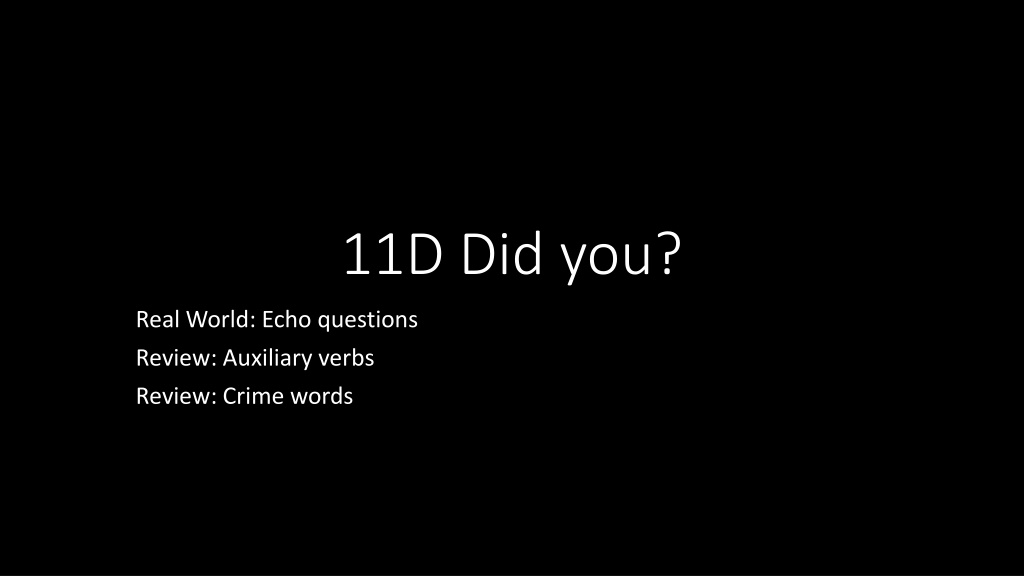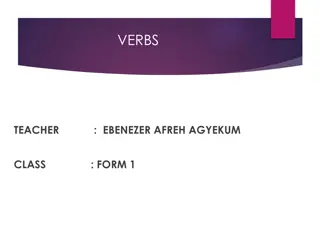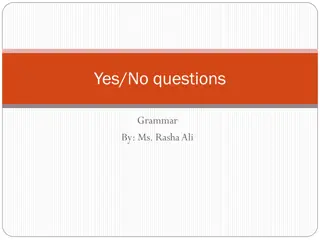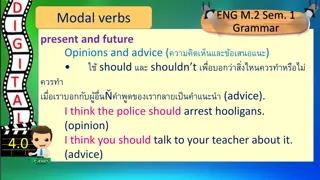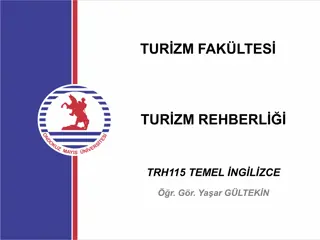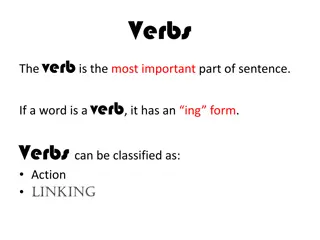Understanding Echo Questions and Auxiliary Verbs in English Grammar
Learn about echo questions and auxiliary verbs in English grammar through exercises and examples. Discover how to respond to positive and negative sentences using appropriate auxiliary verbs. Practice forming echo questions with different verb tenses and sentence structures. Enhance your understanding of crime-related vocabulary within the context of echo questions.
Uploaded on Sep 26, 2024 | 0 Views
Download Presentation

Please find below an Image/Link to download the presentation.
The content on the website is provided AS IS for your information and personal use only. It may not be sold, licensed, or shared on other websites without obtaining consent from the author. Download presentation by click this link. If you encounter any issues during the download, it is possible that the publisher has removed the file from their server.
E N D
Presentation Transcript
11D Did you? Real World: Echo questions Review: Auxiliary verbs Review: Crime words
Please, open your books, p90 and try to do exercise 1. Look at the picture. Where are the people? What are they doing? Then, complete the conversations A-D with these echo questions Didn t you? Are you? Doesn t he? Has she? Please, try to do exercise 2, p90. Check your answers, p156, R11.7
Real World: Echo questions We use echo questions (Didn t you? Are you?, etc.) when we are interested or surprised. We usually use the auxiliary in echo questions: Hanna s had twins. Has she? Not: Has she had? We only use subject pronouns in echo questions: Max doesn t want to sell his computer. Does he? Not: Doesn t he? If the sentence is positive, the echo question is positive: I m going to Rome next month. Are you? If the sentence is negative, the echo question is negative: I didn t go to work today. Didn t you?
To respond to a positive sentence in the Present Simple or Past Simple, we use do, does or did in the echo question: His mother really likes it here. Does she? To respond to a sentence with the verb have got, we use have/haven t or has/hasn t in the echo question: He s got three brothers. Has he? To respond to a sentence with the verb be, we use am, is/isn t or are/aren t in the echo question: My car s twenty years old. Is it? We say Aren t I? Not Amn t I? You aren t in this class. Aren t I?
Please, do the exercises 1/2/3/4, p59, Workbook. Now, please, read the text in R11.10, p56. Angus is talking about his friend, Josh. Respond with an echo question. Answers: Is he? Did they? Did he? Does she? Hasn t he? Has he? Did she? Is she? Are you? Has he?
11 Review, p91, Students book Answers: 1. a) 1.get 2. 2.hasn t gone ... Yet 3. has already phoned 5.has already written 3. c) 1. burglaries 2.robbery; robbers/thieves 3.Murderer 4. a) 1. where 2. who 4. which 5. which 2.pass 3.have 4.have 5.get 4.has just sent 6.get 6.Has she invited ... yet? 4.robbed; stole 3. where 6. who
Thank you for your attention! # hope to see you soon Lecturer Ivana Mila i ivana.milacic@udg.edu.me
